1 Stencil Room
A workshop where we use a squeegee to apply a dye and starch paste mixture through stencils. It works to both dyes color and resist other dyes. This is done one stencil at a time while the fabric is secured to a long table.

See some of our yuzen techniques.
We'll show you our hikizome workshop where we work with the entire length of fabric as it's suspended in mid-air, and the smoothness of katazome screen printing which uses an extensive collection of pattern stencils. (Please understand that we may have to alter the tour course in response to the day's operation)
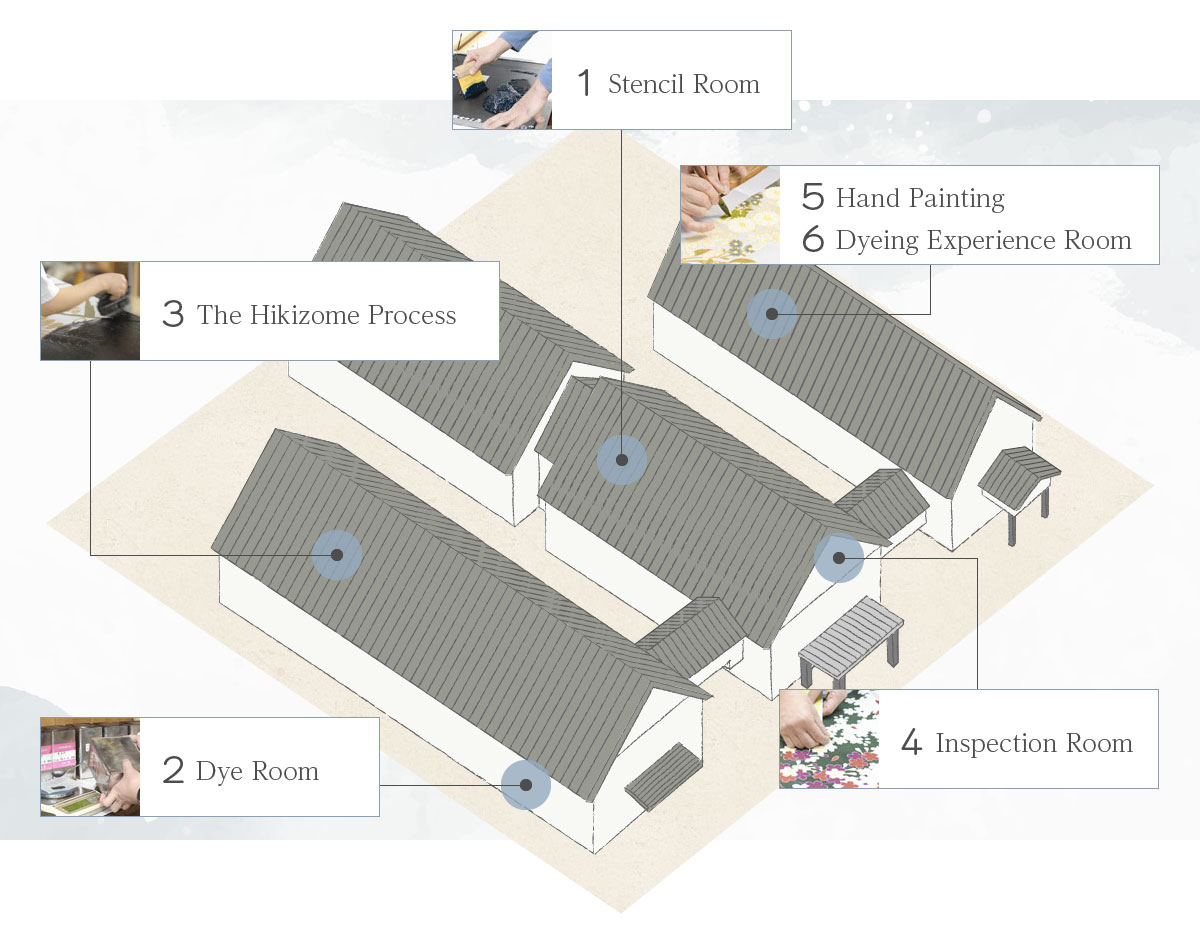
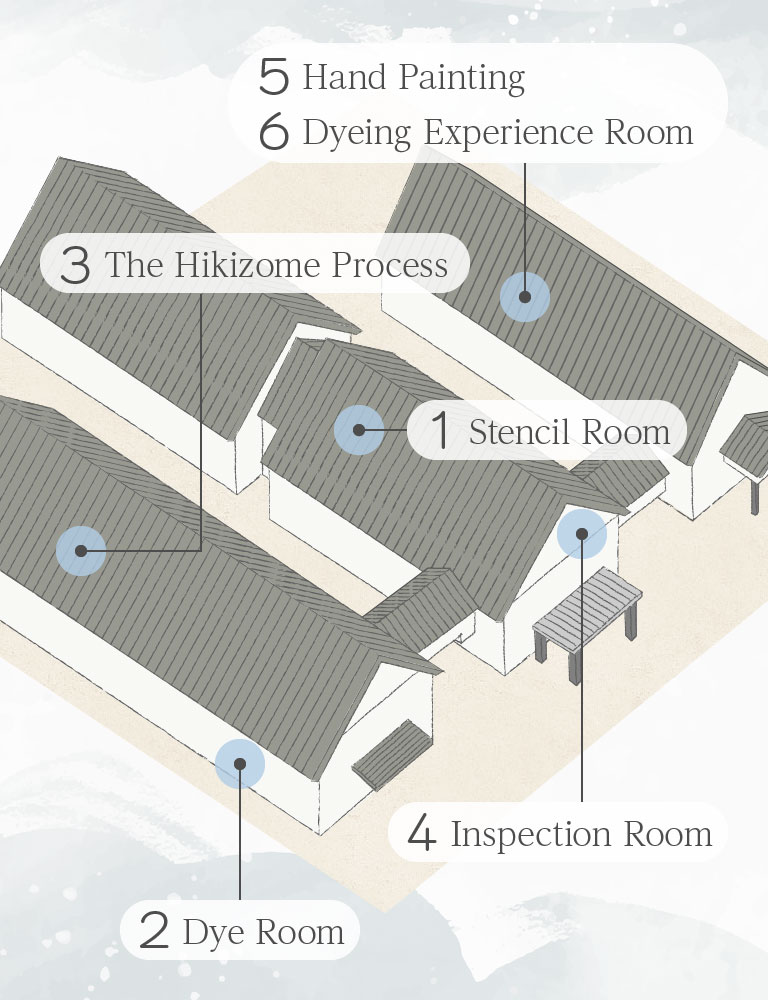
A workshop where we use a squeegee to apply a dye and starch paste mixture through stencils. It works to both dyes color and resist other dyes. This is done one stencil at a time while the fabric is secured to a long table.
The special space where we create all of the dyes needed to dye our kimono. Every dye needs to be crafted to its own unique specification due to the diversity of traditional dyeing techniques we use at the Aoyagi factory. Our workers are experts in color, and work surrounded by hundreds of samples and swatches.
Hikizome is a process to brush-dye the background. We work on the entire length of fabric, suspended in a room with a carefully controlled atmosphere. We also use bokashizome, an advanced technique of utilizing a range of brushes to apply a dye with gradation.
Mujizome is plain-dyeing the entire fabric. Combining these techniques produces depth of color.
Our kimono are carefully examined here after each major process. It's vital that we continuously check the fabric to ensure the quality of the final item.
Tegaki yuzen is one of Japan's most famous dyeing techniques. It is a process that brings a design to life through delicate color application by brush.
As the dye, brush and fabric are all very sensitive to atmospheric conditions, the artisan must work with heightened senses, carefully dyeing each petal one by one until the work is complete.
A space for you to try your hand at dyeing. We will also use this space at the start of your tour to give an introduction to the factory.

See some of our shibori techniques.
We'll show you our okozome (barrel dyeing) room, where we use a dynamic and unexpected method of tie-dying.
(Please understand that we may have to alter the tour course in response to the day's operation)
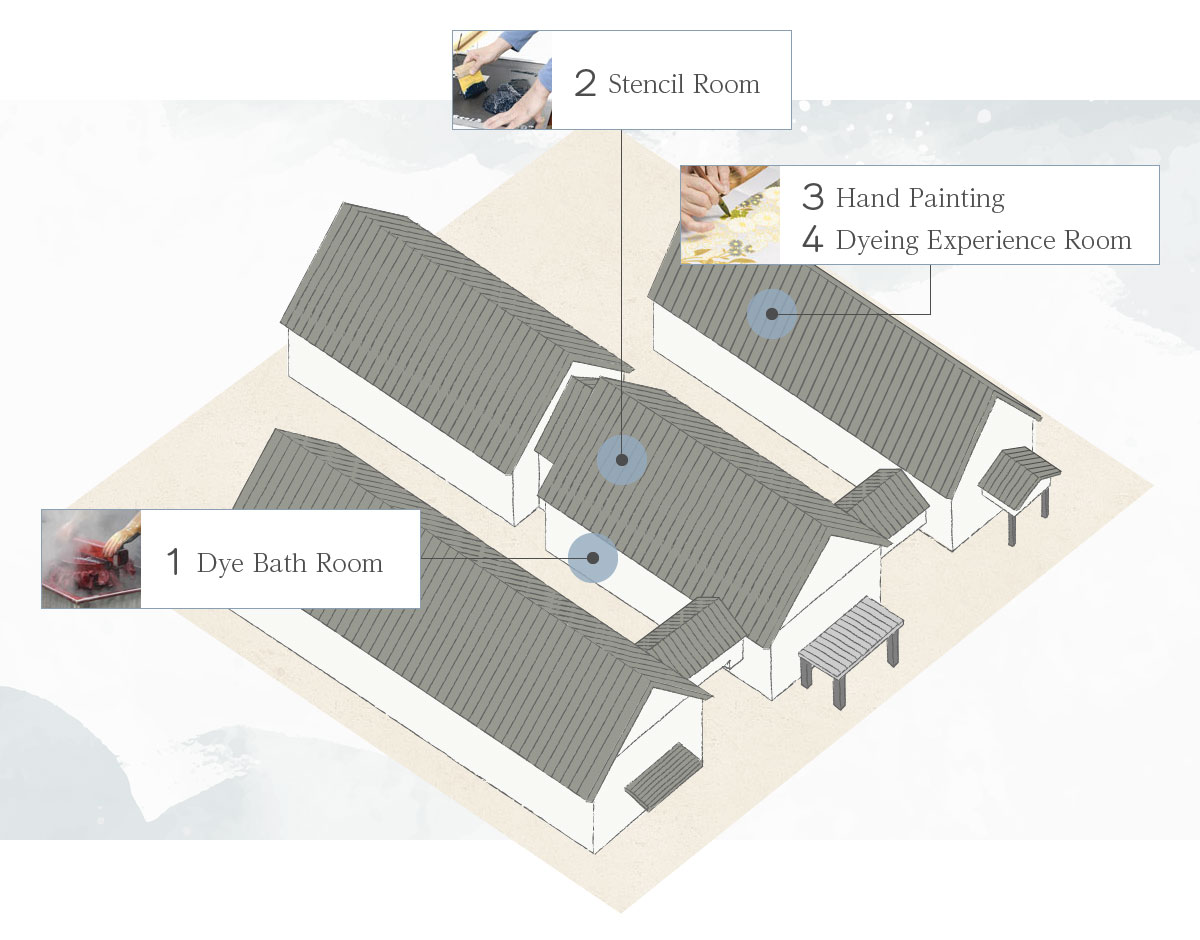
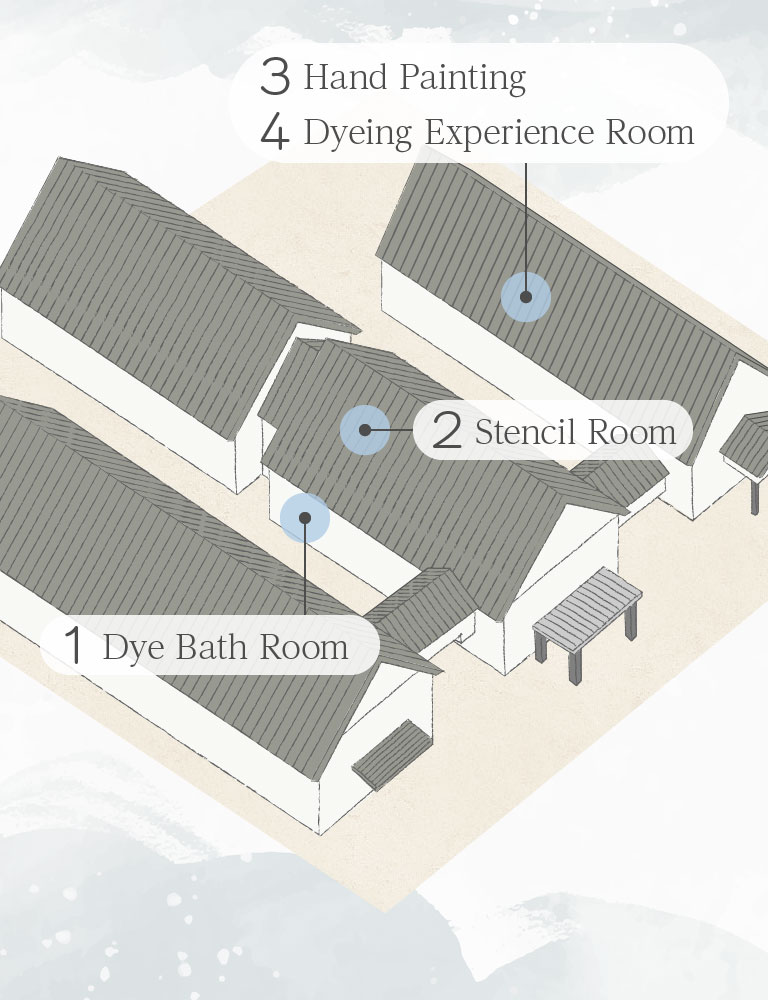
This room contains the vats we use for processes such as okezome (barrel dyeing). As each cypress barrel is submerged into the scolding hot dye, its difficult to gauge the dye's reaction with the fabric so the workers experience really comes into play.
A workshop where we use a squeegee to apply a dye and starch paste mixture through stencils. It works to both dyes color and resist other dyes. This is done one stencil at a time while the fabric is secured to a long table.
Tegaki yuzen is one of Japan's most famous dyeing techniques. It is a process that brings a design to life through delicate color application by brush.
As the dye, brush and fabric are all very sensitive to atmospheric conditions, the artisan must work with heightened senses, carefully dyeing each petal one by one until the work is complete.
A space for you to try your hand at dyeing. We will also use this space at the start of your tour to give an introduction to the factory.

See both our shibori and yuzen techniques.
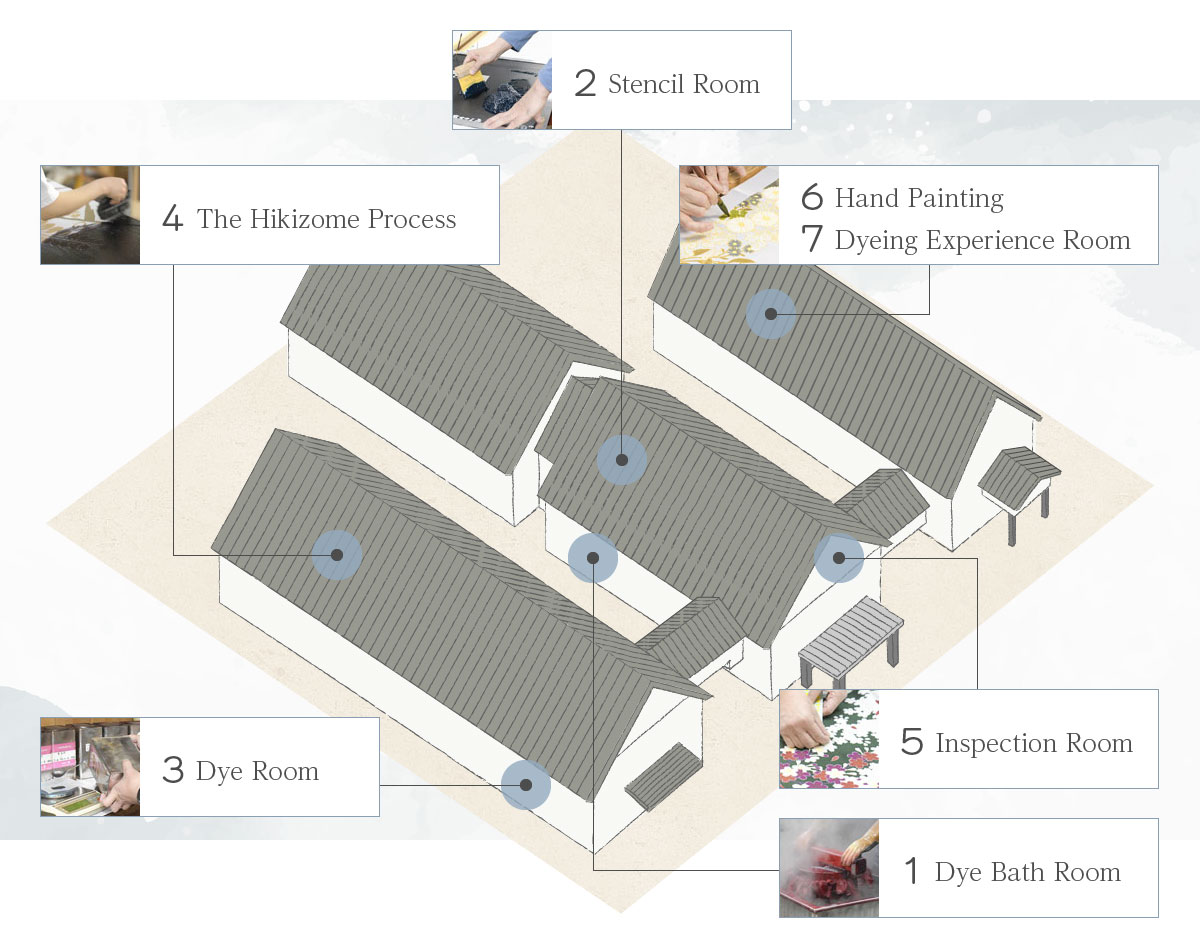
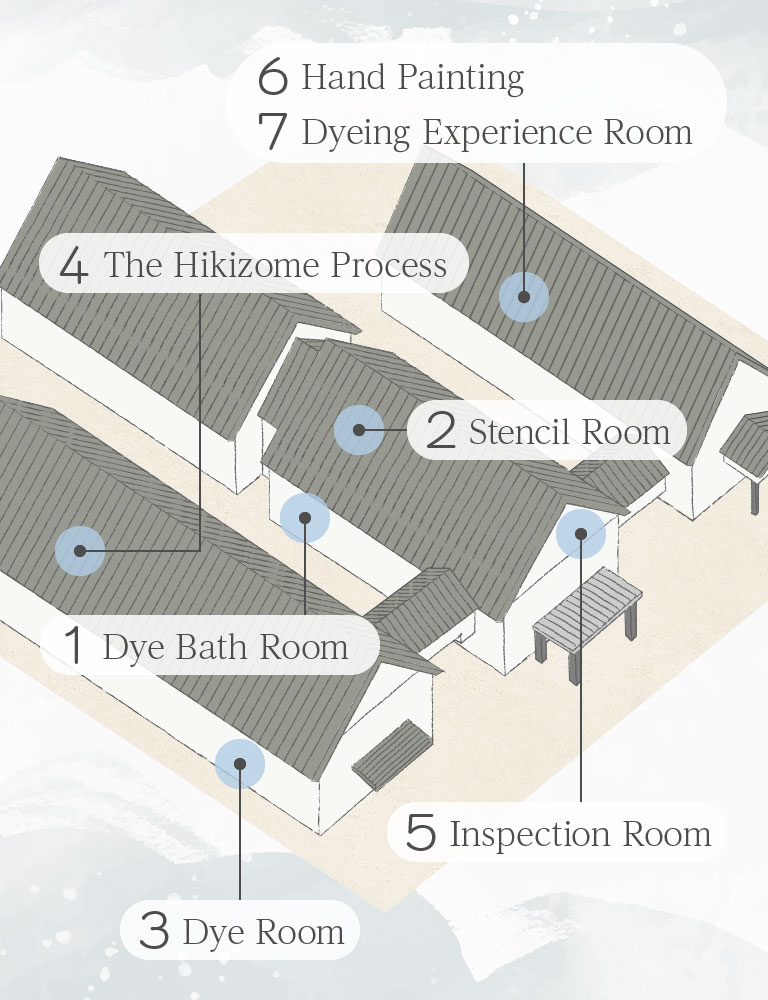
This room contains the vats we use for processes such as okezome (barrel dyeing). As each cypress barrel is submerged into the scolding hot dye, its difficult to gauge the dye's reaction with the fabric so the workers experience really comes into play.
A workshop where we use a squeegee to apply a dye and starch paste mixture through stencils. It works to both dyes color and resist other dyes. This is done one stencil at a time while the fabric is secured to a long table.
The special space where we create all of the dyes needed to dye our kimono. Every dye needs to be crafted to its own unique specification due to the diversity of traditional dyeing techniques we use at the Aoyagi factory. Our workers are experts in color, and work surrounded by hundreds of samples and swatches.
Hikizome is a process to brush-dye the background. We work on the entire length of fabric, suspended in a room with a carefully controlled atmosphere. We also use bokashizome, an advanced technique of utilizing a range of brushes to apply a dye with gradation.
Mujizome is plain-dyeing the entire fabric. Combining these techniques produces depth of color.
Our kimono are carefully examined here after each major process. It's vital that we continuously check the fabric to ensure the quality of the final item.
Tegaki yuzen is one of Japan's most famous dyeing techniques. It is a process that brings a design to life through delicate color application by brush.
As the dye, brush and fabric are all very sensitive to atmospheric conditions, the artisan must work with heightened senses, carefully dyeing each petal one by one until the work is complete.
A space for you to try your hand at dyeing. We will also use this space at the start of your tour to give an introduction to the factory.
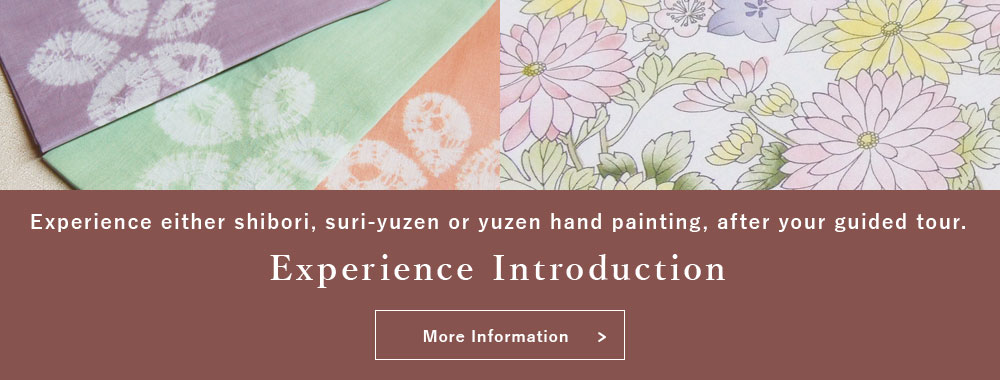
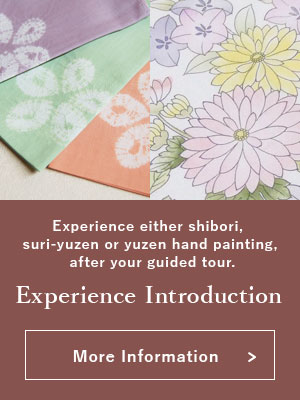
Please select the schedule from the calendar. Click the date to proceed to "Reservation Form".
| Sun | Mon | Tue | Wed | Thu | Fri | Sat |
|---|---|---|---|---|---|---|
1 |
2 |
3 |
4 |
5 |
6 |
7 |
8 |
9 |
10 |
11 |
12 |
13 |
14 |
15 |
16 |
17 |
18 |
19 |
20 |
21 |
22 |
23 |
24 |
25 |
26 |
27 |
28 |
